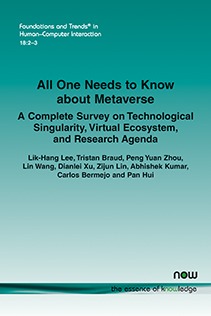All One Needs to Know about Metaverse: A Complete Survey on Technological Singularity, Virtual Ecosystem, and Research Agenda
By Lik-Hang Lee, Hong Kong Polytechnic University, Hong Kong, lik-hang.lee@polyu.edu.hk | Tristan Braud, Hong Kong University of Science and Technology, Hong Kong | Peng Yuan Zhou, Aarhus University, Denmark | Lin Wang, The Hong Kong University of Science and Technology (Guangzhou), China | Dianlei Xu, University of Helsinki, Finland | Zijun Lin, Hong Kong Polytechnic University, Hong Kong and London School of Economics and Political Science, UK | Abhishek Kumar, University of Oulu, Finland | Carlos Bermejo, Hong Kong University of Science and Technology, Hong Kong | Pan Hui, The Hong Kong University of Science and Technology (Guangzhou), China
Abstract
Since the popularisation of the Internet in the 1990s, the cyberspace has kept evolving. We have created various computer-mediated virtual environments, including social networks, video conferencing, virtual 3D worlds (e.g., VR Chat), augmented reality applications (e.g., Pokémon Go), and Non-Fungible Token Games (e.g., Upland). Such virtual environments, albeit non-perpetual and unconnected, have brought us various degrees of digital transformation. The term “metaverse” has been coined to facilitate further digital transformation in every aspect of our physical lives. At the core of the metaverse stands the vision of an immersive Internet as a gigantic, unified, persistent, and shared realm. While the metaverse may seem futuristic, catalyzed by emerging technologies such as Extended Reality, 5G, and Artificial Intelligence, the digital “big bang” of our cyberspace is not far away.
This survey presents the first effort to offer a comprehensive framework that examines the latest metaverse development under the dimensions of state-of-the-art technologies and metaverse ecosystems and illustrates the possibility of the digital “big bang”. It is essential to highlight that the metaverse encompasses diverse technologies and ecosystems, calling it an interdisciplinary and emerging field. Its primary objective is to provide users with satisfactory and interactive experiences. First, technologies are the enablers that drive the transition from the current Internet to the metaverse. We thus examine eight enabling technologies rigorously – Extended Reality, User Interactivity (Human-Computer Interaction), Artificial Intelligence, Blockchain, Computer Vision, IoT and Robotics, Edge and Cloud computing, and Future Mobile Networks. In terms of applications, the metaverse ecosystem allows human users to live and play within a self-sustaining, persistent, and shared realm. Therefore, we discuss six user-centric factors – Avatar, Content Creation, Virtual Economy, Social Acceptability, Security and Privacy, and Trust and Accountability. Finally, we propose a concrete research agenda for developing the metaverse.
All One Needs to Know about Metaverse: A Complete Survey on Technological Singularity, Virtual Ecosystem, and Research Agenda
Since the popularisation of the Internet in the 1990s, the cyberspace has kept evolving. We have created various computer-mediated virtual environments, including social networks, video conferencing, virtual 3D worlds (e.g., VR Chat), augmented reality applications (e.g., Pokémon Go), and Non-Fungible Token Games (e.g., Upland). Such virtual environments, albeit non-perpetual and unconnected, have brought us various degrees of digital transformation. The term ‘metaverse’ has been coined to facilitate further digital transformation in every aspect of our physical lives. At the core of the metaverse stands the vision of an immersive Internet as a gigantic, unified, persistent, and shared realm. While the metaverse may seem futuristic, catalysed by emerging technologies such as Extended Reality, 5G, and Artificial Intelligence, the digital ‘big bang’ of our cyberspace is not far away.
This monograph presents the first effort to offer a comprehensive framework that examines the latest metaverse development under the dimensions of state-of-the-art technologies and metaverse ecosystems, and illustrates the possibility of the digital ‘big bang’. It is essential to highlight that the metaverse encompasses diverse technologies and ecosystems, calling it an interdisciplinary and emerging field. Its primary objective is to provide users with satisfactory and interactive experiences. First, technologies are the enablers that drive the transition from the current Internet to the metaverse. Eight enabling technologies are rigorously examined - Extended Reality, User Interactivity (Human-Computer Interaction), Artificial Intelligence, Blockchain, Computer Vision, IoT and Robotics, Edge and Cloud computing, and Future Mobile Networks. In terms of applications, the metaverse ecosystem allows human users to live and play within a self-sustaining, persistent, and shared realm. Therefore, six user-centric factors are discussed – Avatar, Content Creation, Virtual Economy, Social Acceptability, Security and Privacy, and Trust and Accountability. Finally, a concrete research agenda is examined for developing the metaverse.
